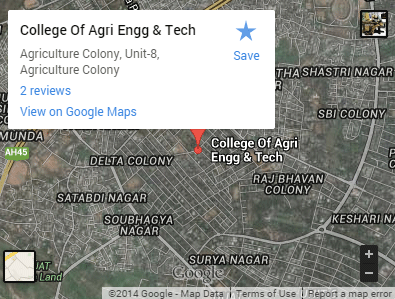(January 19-21,2016)
50th ISAE Convention, 2016
Agricultural Engineering discipline applies engineering science and technology to agricultural production and processing. The basic responsibility of agricultural engineers is to make agriculture sustainable, profitable and competitive enterprise through engineering interventions of farm mechanization, value addition and energy management in production and post harvest operations. The Agricultural Engineers have been immensely contributing in the field of irrigation, drainage, flood and water control systems, planning, supervising and managing agricultural structures and environment control. The different innovations in agricultural engineering have directly contributed to increase yields, improve land use and conserve natural resources, and improve use efficiency of inputs like seed, water, fertilizers, pesticides and fuel. The Agricultural Engineer also recommends strategies to protect the health, safety and security of worker's, animals and agricultural products. Agricultural Engineers have been incorporating automation, precision and smart technologies and intelligence to new and existing equipment. Sensors (including biosensors) are combined with microcomputers, controllers, artificial intelligence and other software, to optimize efficiency, sustainability, and the reliability of our food, feed, fiber and fuel economy.
The importance of agricultural engineering in the world and in the country has increased many folds in recent years. FORBES has rated Agricultural Engineering as the top 10 careers for 2022 in addition to a few other disciplines. Agricultural Engineering has moved a long way in India also. India is the largest manufacturer of the tractor in the world with about 0.7 million units per year having the annual transaction through sale of farm machinery of more than Rs. 850 billion. The role of agricultural engineers has increased many folds with the launching of National Mission on Agricultural Mechanization, a number of programs on Watershed Development, Micro irrigation and Agricultural Processing. More pressure on a straining agricultural system will lead to the rise of Agricultural Engineering - a profession focused on developing better and more sustainable ways to grow food to meet the needs of the world by raising productivity.
The Indian Society of Agricultural Engineers, established in 1960, have played a vital role in developing suitable, well-defined linkages between agriculture sector and industry, so as to give a boost to the agricultural production and processing sector. The Indian Society of Agricultural Engineers has completed 55 years and will be holding 50th Annual Convention. Thus there is a need to discuss the contributions and challenges faced by the Agricultural Engineering profession in the country. The College of Agricultural Engineering and Technology under the Orissa University of Agriculture and Technology will celebrate 50 years in 2016. Thus it is proposed to conduct a symposium in the title Agricultural Engineering in Nation Building: Contributions and Challenges. The annual convention will try to address all different issues through participation of national and international experts and engaging them in meaningful discussion.
To address critical challenges and to increase productivity from available land resources hi-tech intervention with deployment of modern communication and information technology form part of the convention. Sharing and exchanging information and ideas on these advancements at an interventional and national platform would facilitate speedier adoption of new innovative technologies of Agricultural Engineering and offer opportunities for partnership in business.
Useful Links
- Indian Council of Agricultural Research(ICAR)
- Orissa University of Agriculture & Technology
- Central Agricultural University,Imphal,Manipal
- Tamil Nadu agricultural University
- Kerala Agricultural University
- Punjab Agricultural University,Ludhiana
- Swami Keshwanand Rajasthan Agricultural University,Bikaner
- Acharya N.G Ranga Agricultural University,Hyderabad
- Orissa Agricultural Engineers' Service Association
- INDIA TOGETHER: AGRICULTURE
- Agricultural Implements 1
- Agricultural Implements 2
- e-Krishi Shiksha
Contact Details
College of Agricultural Engineering and Technology,Orissa University of Agriculture & Technology,
Bhubaneswar - 751003
Phone: +91674-2562360 (Office);
+91 9437205952(Mobile)
E_mail: caetdean@gmail.com
Contact Hour:: Monday - Friday: 9:00 AM to 5:00 PM
